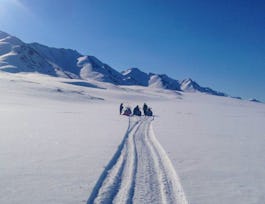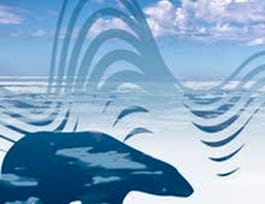In this course, you will learn how the changing Arctic environment is tied to the growing economic and strategic importance of the North. After setting the stage through a review of the peoples of the Arctic and how they are dealing with change, Arctic governance, economies national defense, attention turns to marine use of the Arctic, oil and gas exploration, mining, fisheries and tourism. The course ends with a survey of recent Arctic events.


The North Awakens
This course is part of Arctic Meltdown Specialization
Taught in English

Instructor: Mark C. Serreze
Included with 
Course
(13 reviews)
What you'll learn
Articulate the drivers of the growing economic and strategic importance of the Arctic in the context of the environmental changes unfolding
Identify the impacts of the changing Arctic, both positive and negative, on the peoples of the North
Skills you'll gain
Details to know

Add to your LinkedIn profile
4 quizzes
Course
(13 reviews)
See how employees at top companies are mastering in-demand skills

Build your subject-matter expertise
- Learn new concepts from industry experts
- Gain a foundational understanding of a subject or tool
- Develop job-relevant skills with hands-on projects
- Earn a shareable career certificate


Earn a career certificate
Add this credential to your LinkedIn profile, resume, or CV
Share it on social media and in your performance review

There are 4 modules in this course
This week, we'll take a closer look at the peoples of the Arctic - the Arctic as a homeland - and then turn attention to the role of the Arctic Council of the eight Arctic nations. After a foray into Arctic demographics, we'll briefly look at some of the big economic drivers in the Arctic (setting a stage for later more focused discussion in subsequent modules) and how the changing Arctic is playing into national defense.
What's included
6 videos1 quiz
Here we will learn how the loss of sea ice is opening up the Arctic Ocean to increased marine use and the many issues that have arisen. To set a framework, we will first become familiar with marine use limits in the Arctic Ocean as set by the United Nations Convention Law of the Sea. Then we will explore use of the Northern Sea Route along the Russian Side of the Arctic Ocean, the Northwest Passage through the channels of the Canadian Arctic Archipelago, and the the issues that may play into how heavily these shortcuts between the Atlantic and the Pacific may be used. Finally, we will look at the International Polar Code, which sets requirements for ships operating in polar waters.
What's included
5 videos1 quiz
Large areas of the Arctic are underlain by significant deposits of oil and natural gas. In this week's lessons, we will look at exploration and production activities by Russia, which are occurring all along its shelf seas and over many land areas, the United States along the North Slope of Alaska, the Beaufort and Chukchi Seas, Norway, where all production is offshore, as well as prospects for Arctic development by Canada and Norway.
What's included
4 videos1 quiz
This week, we'll first look at another big sector of the Arctic's economy - mining - using examples such as Nornickel in Russia, the Red Dog Mine and gold mining in Alaska, diamond mining in Canada, and coal mining in Svalbard. Attention then turns to commercial and sport fishing, and the growing tourist industry. Finally, we'll take a look at some recently emerging events in the Arctic.
What's included
4 videos1 quiz1 discussion prompt
Instructor

Offered by
Recommended if you're interested in Economics

University of Colorado Boulder

Fundação Instituto de Administração

University of Alberta
Why people choose Coursera for their career




Learner reviews
Showing 3 of 13
13 reviews
- 5 stars
61.53%
- 4 stars
30.76%
- 3 stars
0%
- 2 stars
0%
- 1 star
7.69%
Reviewed on Feb 7, 2022

Open new doors with Coursera Plus
Unlimited access to 7,000+ world-class courses, hands-on projects, and job-ready certificate programs - all included in your subscription
Advance your career with an online degree
Earn a degree from world-class universities - 100% online
Join over 3,400 global companies that choose Coursera for Business
Upskill your employees to excel in the digital economy
Frequently asked questions
Access to lectures and assignments depends on your type of enrollment. If you take a course in audit mode, you will be able to see most course materials for free. To access graded assignments and to earn a Certificate, you will need to purchase the Certificate experience, during or after your audit. If you don't see the audit option:
The course may not offer an audit option. You can try a Free Trial instead, or apply for Financial Aid.
The course may offer 'Full Course, No Certificate' instead. This option lets you see all course materials, submit required assessments, and get a final grade. This also means that you will not be able to purchase a Certificate experience.
When you enroll in the course, you get access to all of the courses in the Specialization, and you earn a certificate when you complete the work. Your electronic Certificate will be added to your Accomplishments page - from there, you can print your Certificate or add it to your LinkedIn profile. If you only want to read and view the course content, you can audit the course for free.
If you subscribed, you get a 7-day free trial during which you can cancel at no penalty. After that, we don’t give refunds, but you can cancel your subscription at any time. See our full refund policy.


